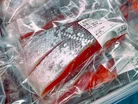Iceland Joins Sainsbury’s & Tyson Foods in Plastic Reduction

In a significant move towards sustainability and efficiency, Iceland Foods, the UK-based frozen food specialist, has announced the nationwide rollout of vacuum-packed beef and pork mince.
This initiative places Iceland at the forefront of a global trend in the retail sector, joining UK based supermarket Sainsbury's and international giants Aldi and Tyson Foods, in the quest to reduce plastic waste and extend product shelf life.
Vacuum packing, a technology dating back to the 1940s, has seen a resurgence in recent years as food retailers and manufacturers worldwide grapple with mounting pressure to reduce plastic waste and improve food preservation.
Originally developed for military food storage, it has evolved into a crucial tool for the modern food industry, offering extended shelf life and reduced packaging waste.
How food industry giants are revolutionising shelf life and sustainability
Vacuum packaging not only reduces food waste, but also offers customers greater flexibility in meal planning and shopping frequency by significantly extending the shelf life of food products.
This allows consumers to buy in bulk, reducing the need for frequent shopping trips and helps in better meal preparation and storage, thereby minimising food waste.
Iceland
Iceland's adoption of vacuum packaging for its entire beef and pork mince range is set to increase the shelf life of beef mince by nearly 50%, extending it to two and a half weeks.
By replacing traditional plastic trays with vacuum packs, Iceland estimates an annual reduction of approximately 35 tonnes of plastic waste.
The new packaging design also creates efficiencies in transportation, with more items able to be transported per truck, further reducing the company's carbon footprint.
Aldi
European supermarket chain Aldi has also been trialling vacuum and flow-wrap packaging for beef mince across select UK stores.
This new method has the potential to reduce plastic usage by up to 73% per product.
Sainsbury’s
Sainsbury's, the UK's second-largest supermarket chain, has implemented vacuum packaging for its entire beef and pork mince range.
Despite some reports of controvery – some consumers having said that the change had impacted the product’s texture and appearance – the move is projected to save 450 tonnes of plastic annually, representing a 55% reduction in plastic per product and the new packaging also extends the shelf life of beef mince by nearly 50%.
Tyson Foods
Internationally, American food giant Tyson Foods, has implemented vacuum packing across various product lines, reporting not only reduced plastic usage but also improved product quality and transportation efficiency.
Amul
Meanwhile, in India, dairy cooperative Amul has introduced vacuum-packed cheese products.
This innovation reduces plastic usage while extending shelf life, particularly beneficial in a country with challenging supply chain conditions.
Worldwide drivers in sustainable packaging
Iceland's initiative is part of a broader global movement in the retail and food manufacturing sectors.
According to Mordor Intelligence, the global market research and consulting firm, the vacuum packaging market is expected to reach US$29.29bn in 2024 and grow to reach US$35.17bn by 2029.
This growth is driven by increasing demand for convenient and sustainable packaging solutions across various industries, particularly food and beverages.
As the food industry continues to innovate in packaging technology, the focus remains on balancing convenience, food safety and environmental responsibility.
Zach Nowell, Trading Manager of Fresh Meat, Poultry & Bacon at Iceland Foods, says: "Our new vacuum-packaged beef mince means our customers are getting the same quality-assured beef mince they love, but with an even longer shelf life."
Claire Hughes, Director of Product and Innovation at Sainsbury's, states: “We know our customers expect us to be reducing the use of plastic across our products are and we’re constantly looking for new ways to innovate to meet our Plan for Better plastic reduction targets.”
--------------
Make sure you check out the latest news at Food Digital, a BizClik brand




